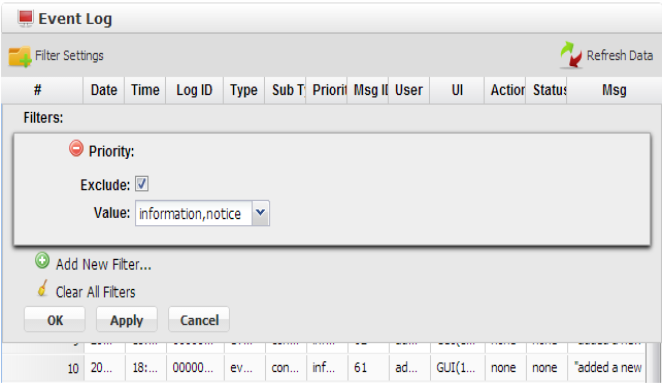Filtering log messages
You can filter columns to display only those log messages that do or do not contain your specified content in that column.
To filter log messages by column contents
1. Go to one of the log types, such as Log & Report > Log Access > Event.
To access this part of the web UI, your administrator’s account access profile must have
Read-Write permission to items in the
Log & Report category. For details, see
“Permissions”.
2. On the tool bar, click the Filter Settings button.
The filter dialog appears.
3. Click the green + icon next to
Add New Filter, then, from the
Field drop-down list that appears, select the name of the column that will be the basis for filtering the log view. Remaining options will change based on what is appropriate to filter that field.

4. To exclude log messages with matching content in this column, mark the Exclude check box; otherwise, leave it clear.
5. For Date and Time filters, define the time period in To and From.
For other filters, in Value, select or type the entire value that matching log messages must contain in that column. Appropriate filter strings vary by the column. With severity levels, for example you can match multiple severity levels by selecting them from the drop-down list.
For example, when filtering the log view based upon the ID column, in Value, you could type an entire, single log ID:
00032009
or you could match multiple log IDs by using an asterisk ( * ) to match multiple characters:
*32009
00032*
*32*
Matching log messages are excluded or included in your view based upon whether you have marked or cleared Exclude.
6. Click OK.
To clear one filter
1. Go to one of the log types, such as Log & Report > Log Access > Event.
2. Click the Filter Settings button.
The filter dialog appears.
3. Click the red X next to the column name in the filter dialog.
4. Click OK.
The page refreshes. It should now include logs that were previously filtered.
To clear all filters
1. Go to one of the log types, such as Log & Report > Log Access > Event.
2. On the tool bar, click the Filter Settings button.
3. Click Clear All Filters.
4. Click OK.
The page refreshes, and should now display all logs of that type, without results filtered out.

